My go to watch for awhile has been the Garmin 265, but my recommendation for brand new runners the Garmin 55. Which meant I was very intrigued by the new Garmin Forerunner 165 and how it would fit in to the mix. Hopefully this review answers that for you as well!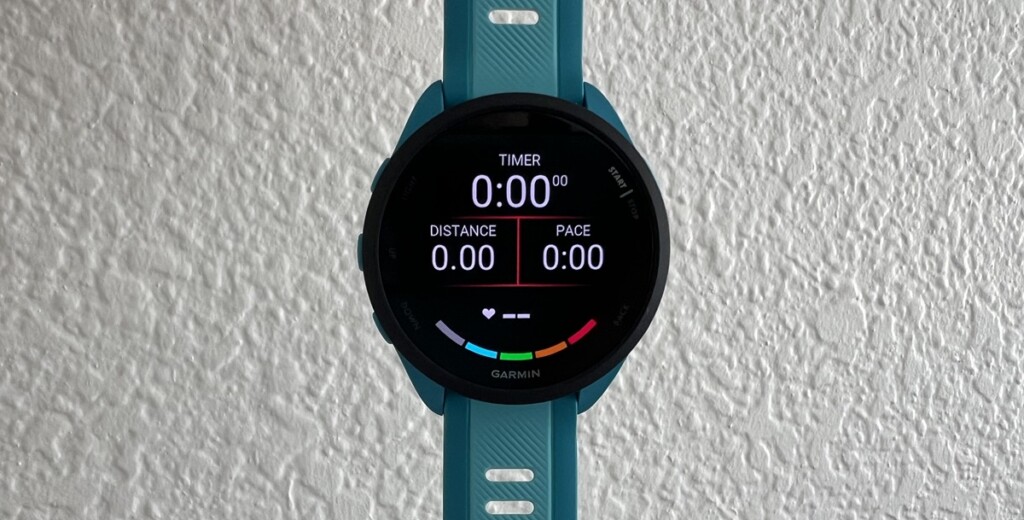 Over the last few years, I’ve found many running shoe brands coming out with models that just didn’t seem to fit anywhere in the line up. And I admit, my first thought was that Garmin might have just confused things with this new watch as well.
Over the last few years, I’ve found many running shoe brands coming out with models that just didn’t seem to fit anywhere in the line up. And I admit, my first thought was that Garmin might have just confused things with this new watch as well.
So let’s take a look at the features and functions to help you figure out if this is the right running watch for you.
Garmin Forerunner 165 Review
Immediately looking at the new AMOLED screen, you’ll feel like this is an upgrade from the Forerunner 55. But in truth the features don’t stop there, so now it becomes a matter of the extra $50 being worth it to you.
I’m going to say that if they don’t change the 55 screen, then the Garmin 165 is now going to be my recommendation for an entry level running watch! Seriously, I love these brighter screens that much.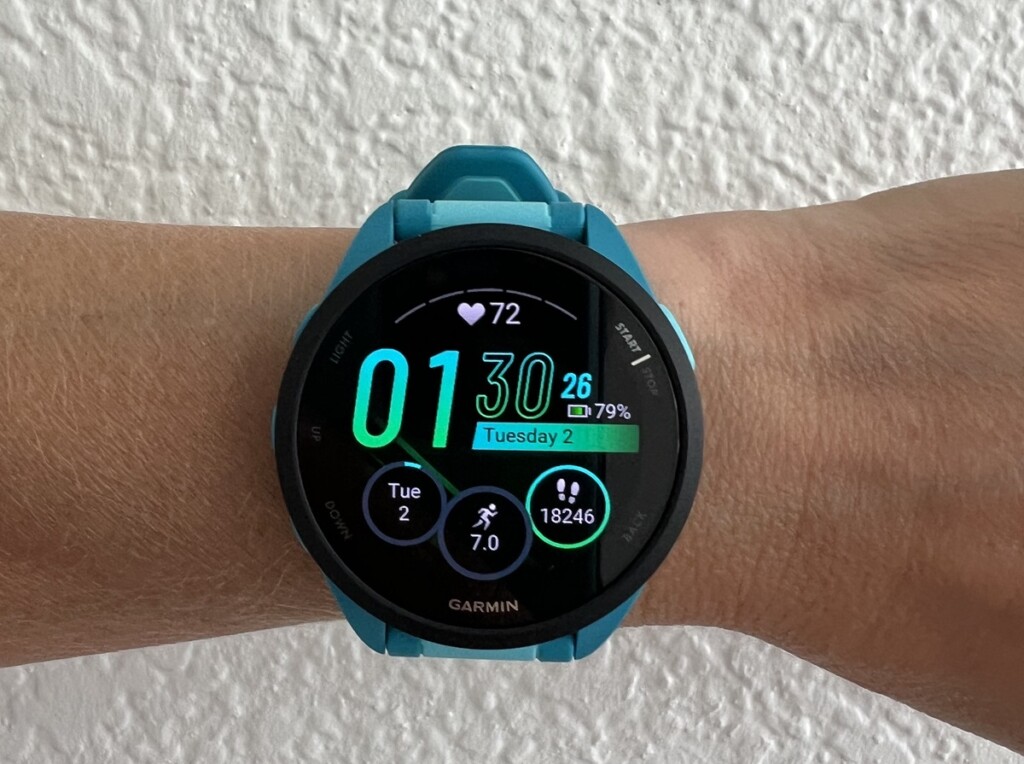 The battery life is actually about 3 days shorter on the 165 and that’s very likely due to the brightness of the screen. Totally worth it for me.
The battery life is actually about 3 days shorter on the 165 and that’s very likely due to the brightness of the screen. Totally worth it for me.
But of course the screen alone isn’t the only upgrade. So I wanted to take out their new entry level watch for runs on the road, trails and treadmill to see what else has changed.
The watch is just a tiny bit bigger than the 55, but not enough that anyone is going to feel overwhelmed by it. The silicone strap is still narrow and comes in a whole variety of colors to match your personality. Just like you can change the amazing colors on the new AMOLED screen!
It’s still a steep price jump from the 165 to the 265 though they now include MANY of the same features.
I’ll do a deeper comparison below, but first let’s talk more about the 165.
165 Forerunner Features
Before jumping in to what’s new on the Forerunner 165, a quick overview of all the bells and whistles that you will find in this watch. I’m not going to break down each one, but give a few more details on one’s that you often ask about.
Upgrade – GPS
Maybe obvious to state this watch has GPS, but an important note that it’s an upgrade from the 55, but not as good as the next level of watches from Garmin.
It’s got mulitple satellites, but not the multi-band GNSS. In wearing two watches to compare (the 265 and the Enduro), the 165 usually recorded a slightly different distance or elevation, particularly if I got off the roads on any trail or side path. But it was a minor amount in the scheme of general training.
However, it’s still way more accurate than all of you running in basic Apple watches!!
The system will easily track your run, trail, track, hike, bike, swim workouts with more than enough accuracy for the beginning runner.
Workouts
Basically options for tracking anything now from running to HIIT workouts to yoga, the list goes on.
EXCEPT triathlon, this watch is not set up to be multisport mode.
A few other key ongoing features:
- Ability to program workouts and HR Zones
- Heart Rate Variability
- Running power
- Pulse OX tracking
- Body Battery – tracking stress and energy levels, sleep tracking, step tracking
- Easily syncs to Garmin Connect to see all of your data
- Suggested Workouts – Yup, not just what you program, but it will create a plan for you. It will start with base workouts to get to know you and then adjust. Nice if you need an idea or aren’t currently focused on a race.
- Pacing Pro – Helping you come up with your race day pacing plan
- Predicted Race times – Using your workouts it will help determine potential race times (this I’m not totally sold on, just VO2Max would have many of us believe we’re elite runners)
NEW – Altimeter
This is a big upgrade from the 55 because now you are getting a more accurate picture of elevation, total ascent and descent over the course of your run. I find this hugely valuable when training for specific races and simply for having a way to better compare one flat 4 miler to a hilly 4 miler.
NEW – Maps
By no means is this on par with the Enduro and other big watches, but there are some new map features that I really like, which is probably due to the altimeter being included.
It does not have the gyroscope of the upgraded watches which make them more valuable for those big trail days.
- Point to point navigation
- Back to Start – hello when lost running in a new location
- Trackback and more
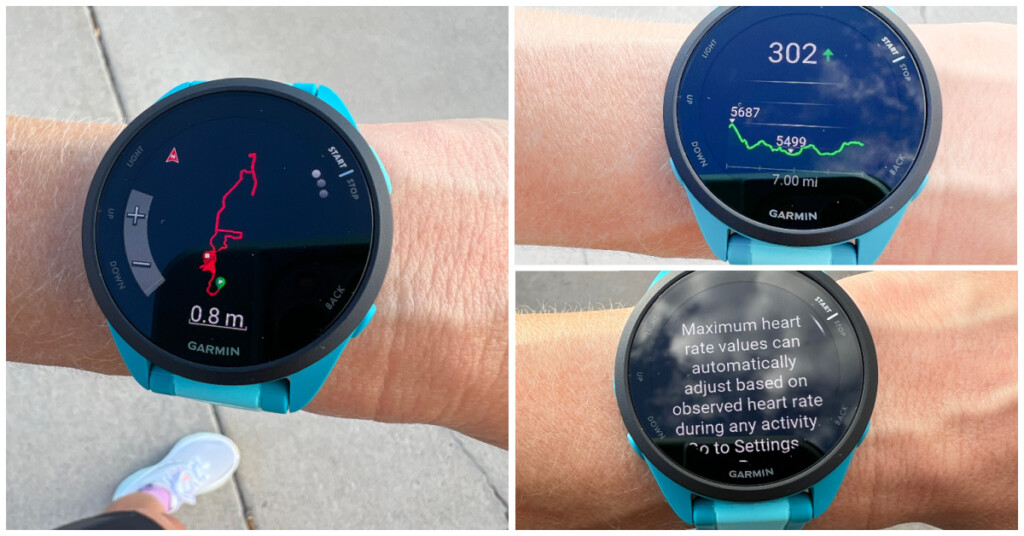
Wrist Based HR
This has been fairly accurate in my tests so far. I often find this declines over time and particularly gets off during the winter. They opted not to put their newest technology in this one, but to continue with an older version that we’ve seen in many watches.
It suffers from the same things as all optical wrist based readings.
My recommendation for everyone who uses HR is to snag the Polar OH1+ armband HR which pairs easily with your Garmin.
I tried test it against the armband and there were some differences, but it wasn’t wildly off. Again, note that it was around 60 degrees and I don’t have dark skin, so these conditions lead to more accuracy.
Treadmill Mode
Let’s start by saying your watch will NEVER be accurate on the treadmill. It can’t use GPS and therefore is trying to rely on stride rate, but can only guess. Luckily, there is a calibrate feature so you can update the final total on your watch before saving.
Once you finish your run, instead of hitting save, you’ll use the down button to select “Calibrate and Save”. This will allow you to update the mileage total.
Overtime the watch should also use this to get closer to accurate with your treadmill runs.
Smart Phone Features
One area that used to set Apple apart was the smart phone features, but really the Garmin’s do almost everything now as well.
- Smart phone notifications and the ability to set if they notify you during workouts
- Weather on your watch
- Safety contacts
- Music controls – not stored music
- Women’s Health Tracking – taking tools from Garmin Connect and adding to watch (i.e. alerts that your cycle is going to start soon and what that might mean for your workout)
- 24×7 respiration rate tracking — They are using this to try and get at heart rate variability, I don’t find that it’s going to be super accurate. So I think this feature has room to grow.
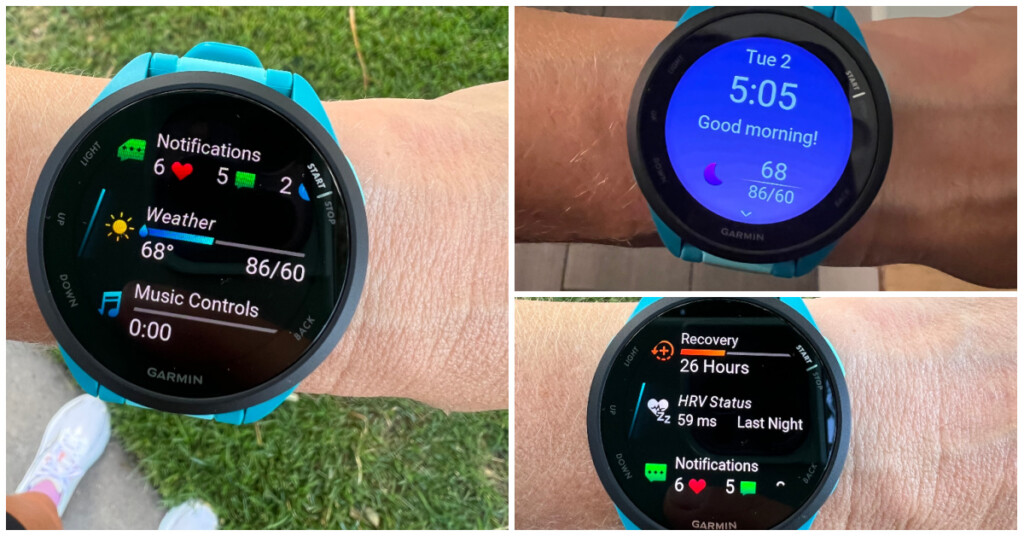
Garmin Safety Features
Possibly one of the things I’m consistently excited to see as a standard feature now is safety.
- Set up your emergency contacts via Garmin Connect
- Decide who and how they should be contacted
- Hold the Light Button for 3 seconds
- It will alert your contacts with your name and GPS location
- LIVE TRACKING – you can autostart this or manually start this to then provide a link that will show your contact exactly where you are while GPS is active
- Incident Detection – this is automatically set up once you have emergency contacts. They aren’t real clear on the specifics, but I can see this being useful when David is biking and suddenly it notices he’s fallen off a cliff.
Customize Data Screens
As someone who likes to focus on Low Heart Rate training to keep easy days easy, I love being able to shift around the data on my watch.
It’s super easy to change the data on your screens by different sports profiles. I like this because I want to see some different data on my trail runs (like ascent) and I want to see things like cadence on my road runs.
- Avg HR, current heart rate, HR Zone
- Pace, Lap Pace, Avg Pace
- Distance, Interval Distance
- Cadence
- Calories
- Time, Lap Time
- Respiration Rate
- Steps
- Stress
- Timer
And when you finish a workout, you’ll see your estimated VO2Max, before putting a lot of stock in that please read this on how to use VO2Max.
Additionally, I do love that it’s always telling you that you have new personal bests for distance, mile, 5K, etc. A new watch gives you a fresh start!
You can easily see these on the watch after the workout is over.
- Hold UP button
- Go to History
- Select Records
Who is the Garmin 165 Best For and Who Should Upgrade?
My Garmin Forerunner 165 review stance is it’s a winning option for darn near ALL runners. In truth, most of us don’t use a lot of the features on our fancier watches.
And it’s a perfect upgrade from Apple or Fitbit to better track your running. The GPS accuracy is going to blow both of those away.
That doesn’t mean it’s the best option all the time. I will likely continue to use my 265 most of the time for just a smidge more accuracy and because I like the strap/larger size better.
Who would be better with an upgrade?
As noted above, I would not recommend it for those doing triathlon. At even the base option, I told David’s boss to get the Garmin 265 for his upcoming training.
Additionally for our big back country adventures (ultra runners), I’m going to continue wearing the Enduro because it simply is way more accurate in those conditions and I like the tools available on it.
Where to buy the Garmin Forerunner 165?
My first recommendation is always to buy directly from Garmin for the warranty and return if for some reason you decide it’s not the watch for you.
The next best option is REI who also has an incredible return policy. I would double check any purchases on Amazon to ensure it’s coming from Garmin and a new watch. The one benefit of Amazon is you can find older models that are still darn good options for cheap. Again the older models won’t have the new brighter screen.
See price and colors on Garmin.com >>
See price and options at REI >>
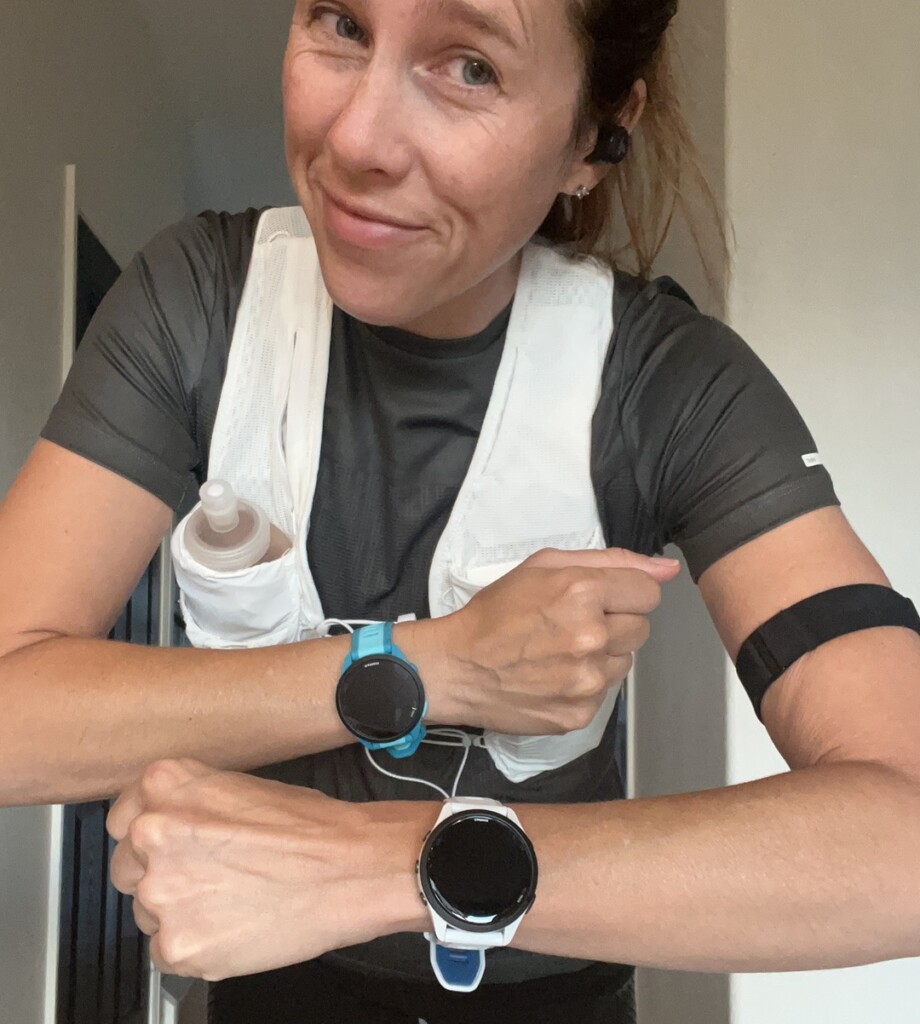
Garmin 55 vs165
All right, let’s get in to some of the nitty gritty with differences that might be worth your extra $50.
The 165 is a slightly larger watch than the 55, and slightly smaller than the 265. I have a small wrist and it didn’t feel overwhelming to me in any way.
- GPS/GLONASS/GALILEO
- 1.04 inch display
- 14 days smartwatch mode
- 20 hours in GPS mode
- $199
Garmin 165
- GPS/GLONASS/GALILEO – improved GPS chipset
- 1.2 inch AMOLED display
- 11 days smartwatch mode
- 19 hours in GPS mode
- Touch screen
- Customize watch faces with large font, Garmin Pay
- Larger memory at 4GB
- Breathwork, nap detection, Pulse OX, altimeter, compass, thermometer
- Open water swimming, track, trail and ultra settings
- Course guidance, HRV, Training Effect
- Stride length, vertical oscillation, running power
- Point to point navigation, back to start, elevation, ascent, descent
- Optional music storage
- $249
Garmin 165 vs 265
As someone who has been using the 265 for my daily runs the last 6 months or so, this was where I really wanted to dive in to the differences for $200. So let’s see what we’ve got.
Garmin 265
- GPS/GLONASS/GALILEO +multiband dual frequency
- 1.3 inch display
- 8 GB memory (4GB in 165)
- Gorilla Glass (better protection)
- 13 days smartwatch mode
- 20 hours in GPS mode
- Multisport mode – auto switches for triathletes
- Gyroscope for more accurate movement tracking
- Detailed tracking for a lot more sports from mountain biking to XC skiing
- Guided on screen workouts
- Lactate Threshold
- Barometric trend with storm alert
- More cycling and swim features
- $449 now on sale most days
- See the Garmin 265
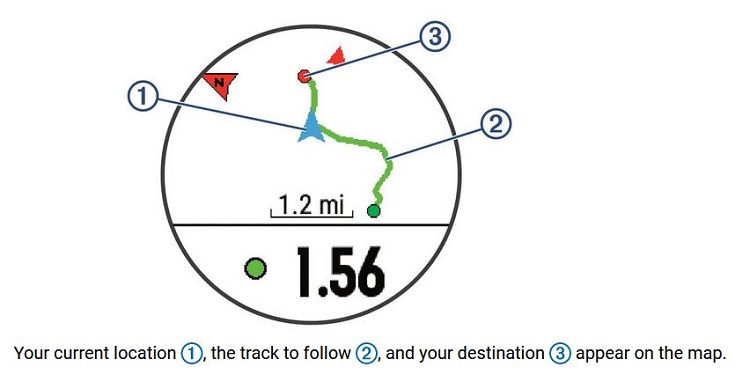
I hope this Garmin Forerunner 165 review helped you see what’s changed and whether this is the watch for your training!
Happy to answer more questions if you have them! But if I had to boil it all down to one thing, it’s that I believe the Forerunner 165 is a winning choice at the price point!!
Still thinking through your options? A little more information:
- Full Garmin Watch Comparison Chart
- Best HR monitors for running
- Coros vs Garmin
- Apple Watch Vs Garmin
Other ways to connect with Amanda
Instagram Daily Fun: RunToTheFinish
Facebook Community Chatter: RunToTheFinish
Sign Up to Receive a Weekly Newsletter with Top Running Tips and Laughs
Other ways to connect with Coach Amanda
Instagram Daily Fun: RunToTheFinish

Facebook Community Chatter: RunToTheFinish
Sign Up to Receive a Weekly Newsletter with Top Running Tips and Laughs



 12 Best Summer Running Shirts for Women and Men
12 Best Summer Running Shirts for Women and Men